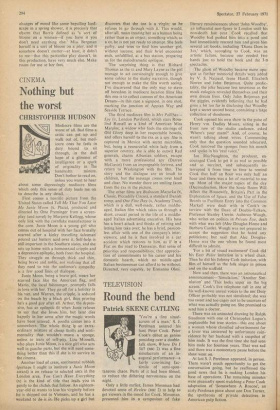CINEMA
Nothing but the worst
CHRISTOPHER HUDSON
Mediocre films are the worst of all. Bad films a critic can get up and walk out of, but med- iocre ones he feels in duty bound to sit through, in the dull hope of a glimmer of intelligence or a spark of originality in The hundredth minute.
Don't bother to read on, unless you want to hear about some depressingly mediocre films which only this sense of duty leads me on to describe in any detail.
First comes a horrific picture from the United States called Tell Me That You Love Me Junie Moon (x, Plaza), produced and directed by Otto Preminger from a screen- play (and novel) by Marjorie Kellogg, whose only link with the cornflake manufacturer is the corn. Junie Moon is a young girl who comes out of hospital with her face brutally scarred after a kinky travelling galesmati poured car battery acid over it. Self-help is still limportant in the Southern states, and she sets up home with a homosexual cripple and a depressive epileptic, both from the hospital. They struggle on through thick and thin, being brave and noble, not realising that all they need to win the audience's sympathy is a few good lines of dialogue.
Junie Moon, being a brave girl, wears her scarred face like the American flag, and Mario, the local fishmonger, promptly falls in love with her. They go off for a holiday in his van, and Warren, the cripple, is seduced on the beach by a black girl, thus proving he's a good guy after all. Arthur, the depres- sive, has an epileptic fit when Junie refuses to say that she loves him, but later dies happily in her arms after the magic words have been uttered. A poodle comes into it somewhere. The whole thing 4 an extra- ordinary mixture of cheap thrills and senti- mentality that wouldn't move a sponge, unless to tears of self-pity. Liza Minnelli, who plays Junie Moon, is a nice girl who acts well in gauche parts, but she will need some- thing better than this if she is to survive in the cinema.
Another load of crass, sentimental rubbish (perhaps I ought to institute a Junie Moon
award) is on release to selected ABCS lit the
London area. You Can't Have Everything (x) is the kind of title that leads. you in gently to the cliches that follow. An eighteen- year-old GI wants to lose his virginity before he is shipped out to Vietnam, and lie has a weekend to do it in. He picks up a girl but
discovers that she too is a virgin; so he refuses to go through with it. This would, after all, mean treating her as a human being rather than as an object; something which, as a GI, he is not yet ready to attempt. She feels guilty, and tries to find him another girl, without success; and their brief encounter ends, unfulfilled, at a bus station, preparing us for the melodramatic epilogue.
The surprising thing is that Richard Thomas as the GI and Mary Layne as the girl manage to act convincingly enough to give some colour to the slushy narrative, though not enough to make the film worth seeing. I've discovered that the only way to stave off boredom in mediocre location films like this one is to collect cameos of the American Dream—in this case a signpost, in one shot, marking the junction of Appian Way and Seaside Terrace.
The third mediocre film is Mrs Poll//ax- Spy (u, London Pavilion), which stars Rosa- lind Russell as a kind of American Miss Marples; a widow who feels the stirrings of Old Glory deep in her respectable bowels, and offers herself to the CIA as a spy. She is captured in Mexico with secret microfilm, but, being a resourceful white lady from a superior country, she is able to outwit Red generals, charm Albanian. soldiers, escape with a more professional spy (Darren McGavin) from an impregnable fortress, and return to Washington with the fiim. The story and the dialogue are an insult to children, but the message comes over loud and clear. No wonder there are smiling faces from the CIA in the picture.
The other films are Bedroom Mazurka (x, Classic, Piccadilly Circus), a standard Danish romp, and One Fine Day (A, Academy Two), which is a dull, well-made, rather middle- aged, Italian film which takes us through a short,.crucial period in the life of a middle- aged Italian advertising executive. His boss has a heart attack and thinks of retiring and letting him take over; he has a brief, passion- less affair with one of the company's inter- viewers; and he is then involved in a car accident which restores to him, as if in a Fiat on the road to Damascus, that sense of priorities and responsibilities, that apprecia- tion of commitments to his career and his domestic hearth, which no middle-aged Italian businessman can afford to be without. Directed, very capably, by Ermanno Olmi,


































 Previous page
Previous page